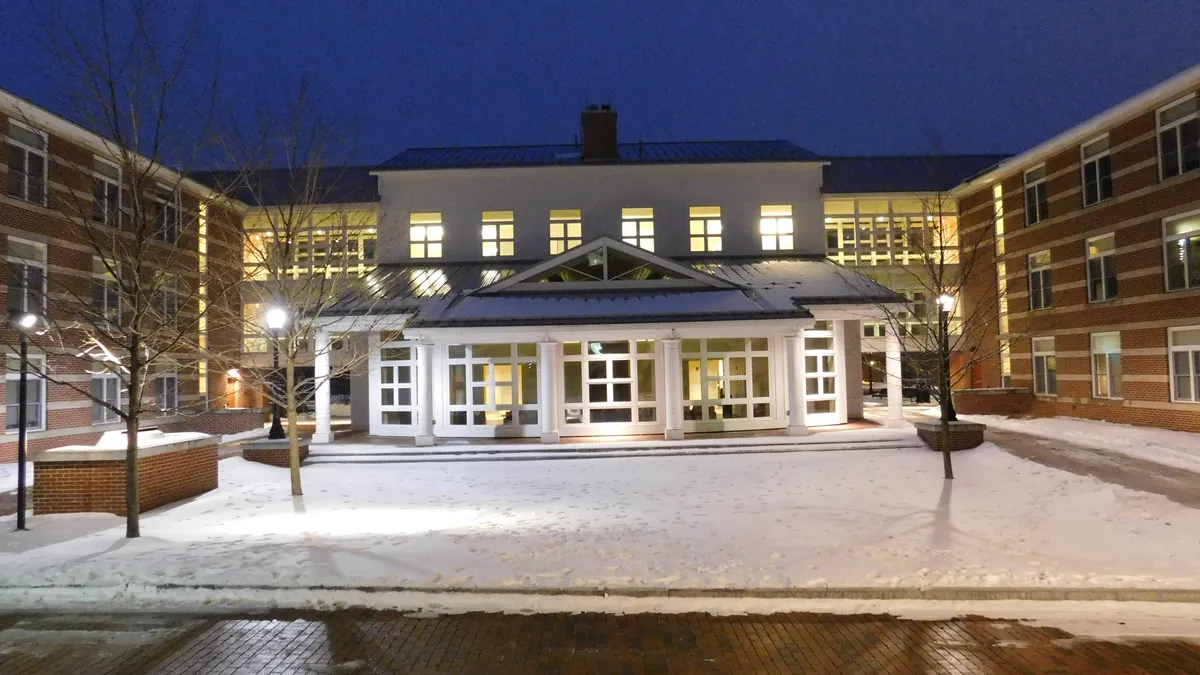Dive Brief:
- Bates College, a top-ranked liberal arts institution in Maine, is appealing a decision by the National Labor Relations Board to permit nontenured faculty and staff to hold a vote on whether to unionize as one group.
- A regional wing of the NLRB in mid-December greenlit more than 600 workers to vote this month on whether to form the union. The "wall-to-wall unit" appears to be the first of its kind for a U.S. private nonprofit college because it would represent both contingent faculty — those who are not on the tenure track — and other employees. Tenured faculty and administrators would not be a part of the bargaining unit.
- But Bates says nontenured faculty have different interests and employment benefits than other staff members and that the two groups should not be mixed in the proposed union.
Dive Insight:
Bates' attorneys are arguing in part that the NLRB should reconsider its approval of the union vote because it raises significant policy questions left unaddressed. Never before has the board allowed for a bargaining unit at a private college that combines faculty and other staff, they said in their appeal.
The unionization effort mirrors similar campaigns across higher education in which new swaths of employees are being recognized. Student admissions workers at Hamilton College, in New York, recently voted to unionize, considered to be a first for this group of employees. And a national debate rages about the legality of college student athletes being classified as workers and whether they can join bargaining units.
In the Bates case, the college is taking issue with a decision to prevent officials from weighing in on the proposed union during a multiday hearing with the NLRB in November. An NLRB regional director blocked all evidence and arguments from Bates because the college filed with the board its statement outlining its position on the union one day late.
The attorneys said the board should reconsider precluding the colleges' arguments and that "there was no demonstrable harm" to the union from the late filing. They added the college's lawyer who was due to file the statement was also contending with his wife and daughter contracting COVID-19 and suffering significant symptoms.
The NLRB's decision stems from an erroneous legal analysis by the regional director, which should be reevaluated, Bates' attorneys said in the appeal.
The college said in the filing that the director erred in finding that the proposed union was "presumptively appropriate," as the NLRB has never approved a unit in which faculty and staff were combined.
The regional director also only offered superficial reasoning for supporting a blended union and did not account for disparate working conditions between contingent faculty and staff, the attorneys argued.
In deciding whether nontenured faculty and staff shared the same interests, the NLRB's regional director considered factors such as all employees working and being able to traverse the entire small campus in Lewiston within about 10 minutes. Employees in different departments also often interact with one another and have the same benefits, the director found.
But faculty have additional employment benefits from staff, the attorneys said, and "the real problem is the fact that the Regional Director studiously avoided the unique and substantial factors that comprise the work life of the faculty — factors that are consequential enough to distinguish them from staff and makes their placement in one unit wholly inappropriate."
The NLRB is slated to mail ballots on Jan. 6 to the roughly 630 employees eligible to vote on whether they want to unionize. About 75 to 95 of those employees are nontenured faculty, according to the appeal document. The unionized workers would be represented by the Maine Service Employees Association, a branch of the Service Employees International Union, or SEIU, one of the largest labor coalitions in the country.
Ballots would be due by close of business Jan. 28 and counted Jan. 31.
The timeline on the vote will remain the same, despite Bates' appeal, according to Diego Grossmann, a spokesperson for the Maine Service Employees Association. But unless the NLRB makes a decision on Bates' request before Jan. 31, the ballots will be temporarily impounded, Grossmann said in an email.
The association's response to Bates' filing is due Jan. 10, he said.
The NLRB did not respond to a request for comment Tuesday.














